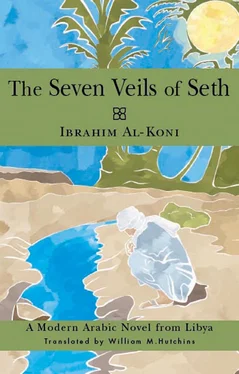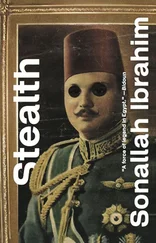“Master, your slave here present before you, has in his lifetime seen calamities that make the affliction of slavery appear insignificant.”
“But don’t people say death is easier to bear than slavery?”
“Death actually is easily borne, master. Death is easier to bear than anything else, even when slavery isn’t the alternative. So, what if we’re able to wager only the body and thereby assure life for the heart?”
“That’s a hard choice!”
“Living’s hard; dying is easy.”
When the master did not respond, he continued, “It’s difficult to live, because we learn through pain. It’s easy to die, because we are made miserable by what we learn.”
The master expressed his agreement in a pained moan like a mournful ballad. He did not leave to sleep until shortly before dawn.
The following evening he sat with his captive and asked him to discuss calamities. So he told his master he had seen a land quake so violently that it swallowed what stood on its surface, a homeland trade one set of inhabitants for another, a windstorm blow hard enough to carry off people and their livestock and bring in other residents, a son raise his hand to stab his father, and a daughter disguise herself each night to couple in bed with her father. He told his master about the effects of an epidemic when it sweeps across the desert, about calamities occasioned by drought, the terrors of hostile raids, and many other afflictions.
It was not hard for the man to discern in each misfortune he heard recounted a message from the spirit world. So he developed a taste for these evening conversations and persisted in sitting with his captive each night until they became boon companions. He told him confidentially one day, “Man should not fear a man who has suffered, because just as there is nothing to fear for a man who has suffered, there is nothing to fear from him.” That was before he put all his possessions at the captive’s disposition. In fact, it was before he made him master over his whole world, so that even the master was at the captive’s beck and call. He commented jokingly at the time they concluded this contract, “In our world, the owner is the slave and the slave the owner. So don’t imagine I freed you when I relinquished control over you. From now on, I’ll be a chain around your neck.” Thereafter he did not discuss anything having to do with his possessions, until he fell prey to an illness that quickly dispatched him. Then his household found in his possessions a piece of leather by which he left his captive half of his livestock along with a gift called freedom. So, emancipated, he returned to his homeland.
He regained his homeland in the northern desert but found no family members, no fellow tribesmen, and no pastures. His family had perished, the tribe had been dispersed, and the earth had been scorched by drought. So he headed south and left half of his herd of camels — untended — to forage for any grass that had survived the lengthy drought in the sandy areas near the oases. Then he settled in the oasis and sold the remainder of his herd in the markets. He built a hut there and waited, gleaning information about his camels from wayfarers and caravan leaders and inquiring about the desert’s condition. The drought’s curse, however, continued unabated. So he thought he would defang calamity by amusing himself. He forgot that man always errs when he decides to amuse himself, because amusement — as subsequently became evident — is actually nothing but an affront to the mind.
Having taken a fancy to a girl from a farming family, he asked himself, “Why don’t I do today what I will have to do some day? Why don’t I give in and hitch myself to a woman, the way my ancestors did before me?” He only realized later that he had committed another error the day he decided to prefer a course of action that had not been recommended by his sovereign intellect but that tied him instead to his ancestors.
He married an oasis girl, and she bound him to the oasis.
Since his early childhood, women had used him in their stirring rituals as a medium charged with elucidating mysteries and furnishing them with news of loved ones who had traveled. Out of all the children whom women of the tribe used as mediums in their celebrations, which they normally called a séance, his reputation for prognostication spread. So the elders took charge of him, delighting in the birth of prophecy in the tribe’s settlements. Some searched his eyes for a sign and others made it their business to strip off his clothes to search for marks. Then they subjected him to an interrogation that lasted several nights. On completing this, they employed a cunning stratagem: they allowed him to play outdoors with the other children, but assigned a playmate to ask a question, so the child would not be intimidated by the presence of adults. They dispatched the boy, who was charged to return with an answer. They waited for several days before he brought back the response. When this prophecy was fulfilled, they announced to the tribe the birth of a diviner.
Many, however, were suspicious and — typically — denied the birth of prophecy. A rascal, who mocked the boy, accosted him, tossing a date to his hand and a malicious question to his face: “Do you think I’ll find my lost milking camel when I go out to search tomorrow?”
The boy immediately cast him a mysterious look before inquiring, “Did you say the camel is in milk and lost?” Without waiting for a reply, he continued, “Yes, indeed; you will find your lost she-camel.”
The wretch roared with maniacal laughter and then shouted to everyone: “Hear that? He said I’m going to find my lost milking camel, even though you all know perfectly well I don’t have either a milking camel or a lost one.” The assembly bellowed with laughter too.
The spirit world, however, decided to brand the rascal a liar and to vindicate the prophet, for a few days later — accompanied by a few companions — that man went out to search for truffles in the western plains, where he was bitten by a viper. His comrades scouted around for a passing caravan but found only a female camel, which bore him back to the encampments. Their astonishment was profound when they learned that the camel had not only been lost by one of the tribe’s nobles but was called “Milch Camel,” for her copious yield of milk. From then on, the scoffers left him alone and even the clever acknowledged his gift.
Even so, as he matured to manhood, he had more difficulty tapping into the prophetic visions that had burst into his heart when he was a child. Then the elite urged him to try solitude, and he began to head out to distant deserts — taking refuge in the mountains and secluding himself from the world there for days or weeks — so that he might bring reliable information home to the tribe. As time rushed past, he realized that solitude was not the only price paid for prophecy but only another link in a chain that terminated with what he came to call “the nightmare.” This is a lethal corridor, and he learned from experience that the only thing harder than leaving it is gaining access to it. He would disappear in waterless deserts and explore many different homelands, roam through redoubts, and lose his own identity in his quest, until the firebrand glowed and the passageway flashed with sparks transforming it from an entryway that was flooded with darkness into a corridor that glowed with a vision.
This effort drained him. His body did not merely burn with fever; he also felt empty, and this emptiness made him feel sad. He had tried repeatedly to renounce the whole business and put an end to this quest for inspiration, asking, “Why do I need prophetic vision? What’s the use of prophesying for a tribe that will eventually learn what is to come anyway? What’s the use of our discovery of secrets of the Unknown, if we cannot circumvent what the Unknown’s secrets bring us, whether for good or ill?”
Читать дальше












